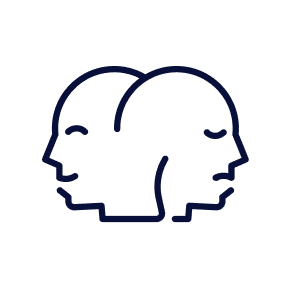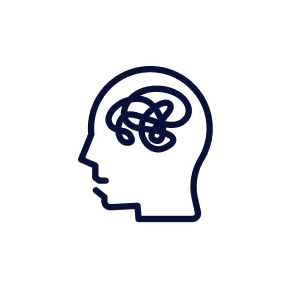Sadly, instead of seeking the necessary help, many of them self-medicate with drugs or alcohol. Lakeview Health offers a comprehensive PTSD treatment center in Jacksonville, Florida, to help overcome both PTSD and addiction simultaneously. Through our inpatient trauma treatment center, you can find the help you need for not only your addiction but for the trauma you’ve experienced as well. Trauma-informed care at Lakeview Health not only focuses on healing but aims to avoid retraumatization of our clients during the healing process.
PTSD is often a contributing factor to substance use disorder or addiction. It is quite common for individuals to be unaware that they are struggling with trauma or evincing signs and symptoms of PTSD. However, they are aware they are in distress. Using drugs or alcohol as a form of self-medicating gives individuals a sense of control and temporarily alleviates their pain. Yet, it puts individuals at a much higher risk of developing a dependency or addiction, which in turn only exacerbates their unresolved trauma. When individuals experience both a mental health issue like PTSD and a substance use disorder, they are said to have a co-occurring disorder. This requires both conditions are treated at the same time. At Lakeview Health, our Dual Diagnosis Treatment Programs focus on how to help patients heal from both their mental health issues and treat their substance abuse. Doing so allows the individual to heal more fully and make a lasting recovery.
While millions of servicemen and women struggle with PTSD as an outgrowth of their military experiences, it is not exclusively the case. Trauma can affect anyone at any time. In fact, PTSD is often a natural response to a traumatic event that people cannot process and cope with.
When an individual experiences an event such as death, a physical threat, or injury to oneself or another, he or she is said to have experienced a traumatic event. Common physical causes of PTSD can be ongoing distress caused by sexual abuse, violence, the threat of violence, or catastrophic events.
PTSD symptoms include anxiety, recollections, or flashbacks that are triggered by familiar events or feelings related to an initial trauma. To relieve the stress and confusion associated with such triggers, an afflicted individual may turn to use drugs and alcohol. Substance abuse is a self-destructive coping mechanism that feels necessary for instant relief from symptoms.
Mental health professionals break down the symptoms individuals experience into several different criteria to understand if and just how PTSD is affecting individuals. These include:
Because each individual’s trauma is different, there is no certainty that something that triggers one person will trigger another. Due to this variability, some people erroneously believe that trauma or PTSD is something that can be grown out of. Triggers will always be unique to the individual. However, their effects are often similar. Because of the intensity of the experience and triggers, PTSD patients can suffer from depression, anxiety, confusion, or memory loss. The trauma can cause significant mental health issues and impair a person’s ability to function in an everyday setting.
When symptoms do not ease or disappear, patients are left exhausted. Feelings of despair, hopelessness, and low self-esteem become an overwhelming reality. Symptoms of PTSD may include:
An individual needn’t display all these symptoms to be diagnosed with post-traumatic stress disorder. However, if any of them are persistent and severe, then it is likely someone is struggling with PTSD. There is no reason to allow symptoms like these to persist. With the right support like the therapies offered at Lakeview Health, individuals can not only discover, reveal, and overcome their triggers but ultimately work through their trauma and heal.
There is a high correlation between physical or sexual trauma and alcoholism. Some who have suffered natural disasters may also increase alcohol use due to the experience of trauma. Symptoms of post-traumatic stress disorder are extremely uncomfortable and also classified as anxiety-related. Alcohol is the drug of choice for individuals who are self-medicating symptoms of PTSD; however, some addicts may also abuse benzodiazepine medications.
According to the American Society of Addiction Medicine, repression and denial are defenses used by people experiencing abuse or trauma. Both of these defense mechanisms are also found in the behaviors of those addicted to drugs or alcohol. As unhealthy coping mechanisms, repressions and denial tend to perpetuate substance abuse. An individual struggling with PTSD is looking for a means to escape their residual traumatic feelings. Often, it’s through using drugs or alcohol that a person is able to momentarily overcome their discomfort and distress. However, substance abuse only helps superficially, leaving the trauma unresolved and provoking the individual into further use of drugs or alcohol to cope. Individuals will begin to disconnect from reality. Yet, the trauma they are trying to avoid only deepens.
Substance use disorder or addiction and PTSD create a negative feedback loop leaving the individual dependent upon drugs or alcohol and still struggling with mental health issues. Thus, our dual diagnosis treatment program at Lakeview Health is designed to treat both addiction and trauma simultaneously so individuals may heal more fully. A trauma disorder treatment program is essential to help those with PTSD and an addiction stop the cycle of abuse.
Drugs and alcohol can become part of the coping mechanisms individuals with PTSD use to ease their pain and torment. However, drug and alcohol addiction complicates the brain chemistry and the physical manifestation of these disorders. Treatment for only one of these co-occurring disorders will not provide a patient with a positive outcome. Treatment of PTSD with concurrent drug and alcohol addiction treatment programs is required.
An integrated approach in a dual diagnosis treatment center, such as the one offered by Lakeview Health, is optimal. This is why we offer clinical care for our clients that can help them recover and heal. Our team of clinical and medical experts works together to create unique treatment plans that meet the needs of each of our clients. Our dual diagnosis treatment program is designed not only to help individuals deal with PTSD, but any other mental health condition they may be struggling with that is impacted by or provoking substance abuse. For example, our program can treat:




We also understand the importance of trauma-informed care. Our inpatient trauma treatment center provides the clinical care you need while also being aware of your emotional needs. We support and guide our clients through treatment without causing retraumatization to the individual. Our team also identifies the importance of gender-specific care in instances of trauma when necessary.
No matter what your needs are, our team of counselors and therapists can work alongside you to create a customized plan of treatment. To begin with our programs or to learn more about what we offer, contact Lakeview Health today by calling 904 677 5010. Our admissions team is ready to answer all questions and get you started on our intake process.